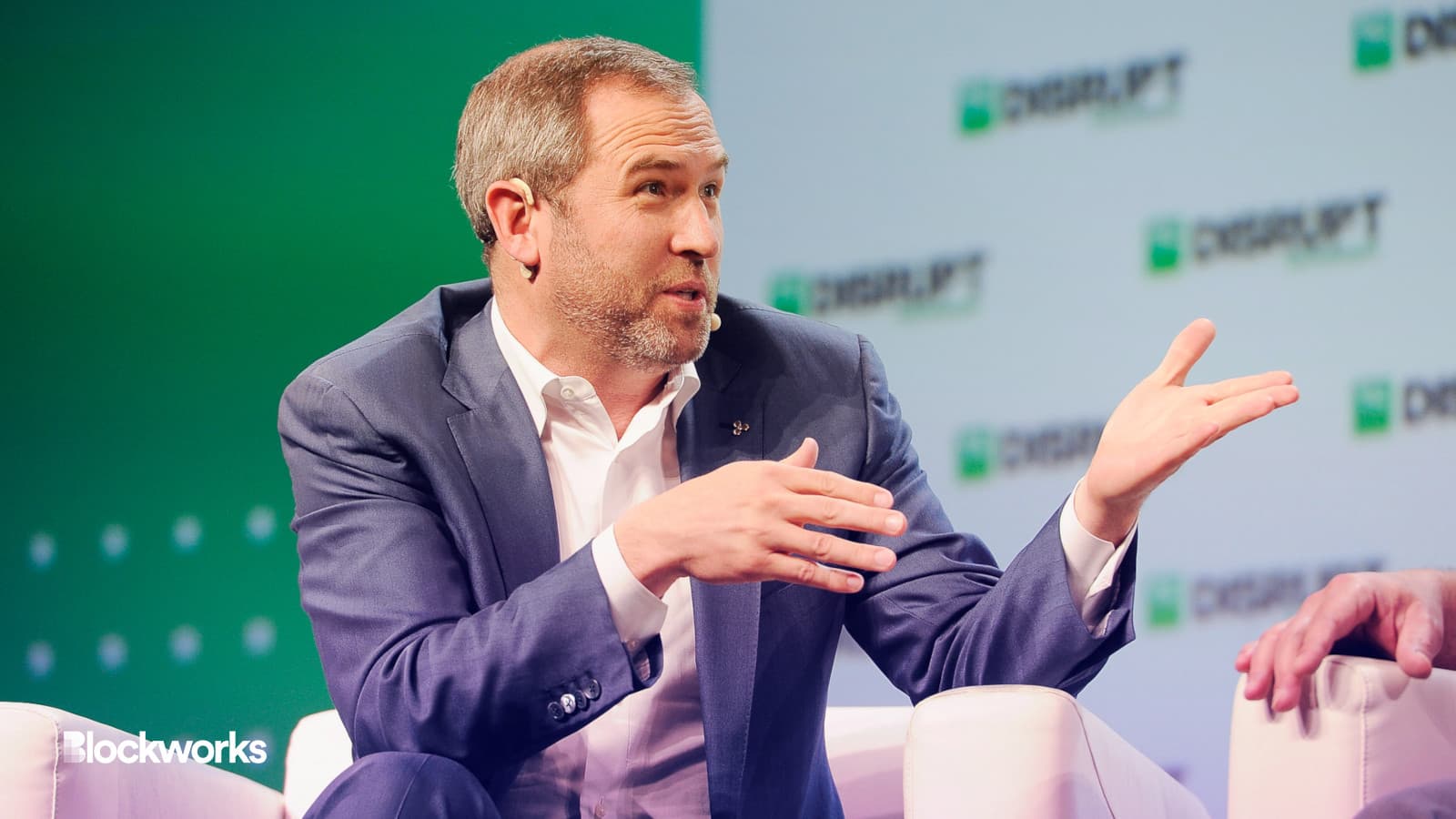SEC v. Ripple: Could The XRP Case Go To Trial?
Insiders expect a result in the long-running SEC case against XRP any month now, but a trial is still possible

Ripple CEO Brad Garlinghouse | Source: TechCrunch (CC license), modified by Blockworks
To trial or not to trial. That is the question.
Or at least one question for SEC vs. Ripple Labs, one of crypto’s most watched cases that is more than two years old and counting.
Which party will come out on top is, of course, another.
The SEC alleged in 2020 that blockchain developer Ripple Labs and two of its executives raised more than $1.3 billion in 2013 through the sale of crypto token XRP in an unregistered security offering.
US District Judge Analisa Torres, who is presiding over the case, could make a ruling in favor of either side — which would avoid a trial — or put the matter before a jury.
The SEC said last May it would add 20 people to its Crypto Assets and Cyber Unit, within the commission’s enforcement division, and has more recently ramped up its regulation by enforcement. The agency, with those roles mostly filled, now seeks to add more staff to the team, CoinDesk reported last week.
“Given the litigious inclinations of the current SEC leadership and news reports about additional attorneys being hired in the enforcement division, we have to assume they are gearing up for trials if necessary, including in the Ripple case,” said Matthew Sigel, head of digital assets research at fund manager VanEck.
Read more: Will The SEC Target Crypto Validators and Protocols Next?
Toby Galloway, chair of the securities litigation and enforcement practice group at law firm Winstead, told Blockworks he doesn’t necessarily expect the case to go to trial.
SEC and Ripple, according to Galloway, have moved for summary judgment — a decision made based on statements and evidence without going to trial — by arguing there are no genuine issues of material fact.
“When both sides agree that there are no fact issues, it becomes more likely that the court will grant a summary judgment for one side or the other,” Galloway said. “But it is possible that the court could disagree and decide that there are disputed fact issues that must be decided by a finder of fact at a trial.”
How could the court rule?
In the case against Ripple, the SEC is seeking injunctive relief — a remedy which restrains a party from doing certain acts or requires a party to act in a certain way.
Injunctions are supposed to be issued only when there’s a likelihood of continuing violations by the defendants, according to Marc Powers, a former securities law practice leader at Baker & Hostetler and adjunct professor of blockchain law at Florida International University.
The Financial Crimes Enforcement Network (FinCEN) already went after Ripple years ago, he added. It claimed in 2015 that Ripple violated several requirements of the Bank Secrecy Act (BSA) by acting as a money services business (MSB) and selling XRP without registering with them.
Ripple agreed to pay a $700,000 penalty to FinCEN and register with the regulators a money services business.
“With that background, and the nature of the way the SEC is alleging the violations here … I think the court could say either there’s no violation of the registration provisions or they won’t grant the injunction,” Powers said.
The case will likely go to trial, Powers said, which would leave the jury to decide if the defendants failed to comply with securities registration. Still though, he added, the judge would determine whether it’s appropriate to issue an injunction.
Potential XRP trial timeline
The SEC and Ripple can still submit pleas with new information for Torres to consider. Ripple said in a filing last week that a recent Supreme Court case — Bittner v. United States — supports its “fair notice defense.”
The Due Process Clause of the US Constitution requires individuals be given fair notice of which actions are prohibited by law.
XRP is up 4.4% in the past week, as of 5:10 am, ET.
A summary judgment could come in three to six months, Powers said. If it’s not granted, it could take up to six months for a trial to begin. Such a trial would likely last between two and four weeks, in Powers’ estimation.
Galloway said he expects a trial would take at least a month.
“The court has recently limited some of the expert opinions that can be offered, but did not exclude any expert in his or her entirety,” Galloway said. These experts are in addition to any fact witnesses who may testify, including the two individual defendants. That evidence will take some time to present.”
Get the news in your inbox. Explore Blockworks newsletters:
- The Breakdown: Decoding crypto and the markets. Daily.
- 0xResearch: Alpha in your inbox. Think like an analyst.






